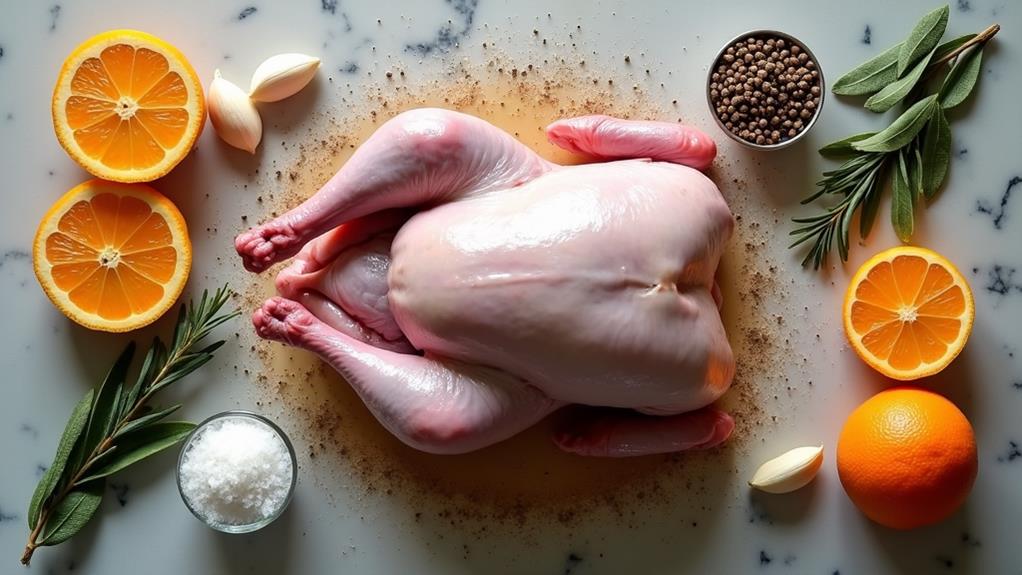When you think of a festive gathering, roasted duck often comes to mind, especially in homes celebrating Lunar New Year. You might appreciate its rich flavor and crispy skin, but have you considered the cultural significance behind its preparation? As you explore the history and various recipes, you'll discover how this dish has evolved across different cuisines, each adding its own unique twist. Understanding these layers not only enhances your culinary appreciation but also invites you to reimagine your next special occasion. What makes this dish so beloved worldwide?
Key Takeaways
- Roasted duck, particularly Muscovy, is celebrated for its rich flavor and crispy skin, perfect for festive meals.
- Proper preparation includes defrosting, scoring the skin, and generous seasoning with salt and pepper.
- Start roasting at a lower temperature before increasing it to achieve crispy skin, typically roasting for around 2 hours.
- Allow the duck to rest after cooking to retain moisture, aiming for an internal temperature of 165°F (74°C).
- Leftovers can be stored in an airtight container for 3-4 days or frozen for up to 3 months.
History
Roasted duck has a rich history that spans multiple cultures and occasions. You mightn't realize it, but this delicious dish has roots in ancient civilizations, with evidence of its popularity found in Roman and Medieval European diets. Back then, it was often reserved for nobility, showcasing its status as a luxury food.
Fast forward to today, and roasted duck remains a staple for festive occasions around the world, whether it's Christmas in Europe or the Lunar New Year in China.
One of the most famous styles is Peking duck, celebrated for its mouthwatering crispy skin and tender meat. Traditionally, it's served with pancakes and hoisin sauce, making every bite a delightful experience.
In Ukrainian culture, roasted duck holds deep cultural significance, often gracing family tables during important gatherings, emphasizing the importance of traditional recipes passed down through generations.
Today, modern cuisine embraces roasted duck in diverse ways, experimenting with various spices and glazes that reflect regional flavors.
Recipe

Roasted Duck
Roasted duck is a succulent dish known for its rich flavor and crispy skin, making it a perfect centerpiece for festive occasions. The Muscovy duck, in particular, is favored for its tenderness and robust taste. When preparing this dish, the key is to allow the duck to defrost properly and to season it generously. The combination of fresh aromatics like orange and sage enhances the natural flavors of the duck, while scoring the skin guarantees that the fat renders effectively during roasting, resulting in a beautifully crispy exterior.
To achieve the perfect roast, it's important to follow the cooking times and temperatures closely. Starting at a lower temperature helps to cook the duck evenly, while increasing the heat towards the end gives that coveted crispiness. Allowing the duck to rest after cooking is essential for juicy meat. This dish not only serves as a delightful main course but pairs wonderfully with seasonal sides, creating a memorable dining experience.
Ingredients:
- 1 organic Muscovy duck (5 to 6 pounds)
- Kosher salt
- Black pepper
- Fresh orange, quartered
- Fresh sage
- Optional: additional aromatics like garlic or thyme
Instructions:
Begin by defrosting the duck in the refrigerator for 1-2 days, then rinse and pat it dry thoroughly. Score the skin in a diamond pattern and season generously with kosher salt and black pepper, both inside and out. Stuff the cavity with fresh orange quarters and sage for aromatic flavor.
Preheat your oven to 350°F (175°C), and place the duck in a Dutch oven, covering it to roast for approximately 1 hour and 40 minutes. After this initial cooking period, uncover the duck, increase the oven temperature to 400°F (200°C), and roast for an additional 30-35 minutes until the skin is crispy. Confirm the internal temperature of the duck reaches between 155°F and 165°F, then allow it to rest for about 10 minutes before carving.
Extra Tips:
Make certain to keep the duck dry before seasoning to achieve the best possible crisp on the skin. Consider using a meat thermometer to check for doneness accurately. If you have a lot of fat rendered during roasting, you can save it for cooking vegetables or making crispy potatoes later. Additionally, feel free to experiment with different aromatics based on your personal taste preferences.
If you enjoy this roasted duck recipe, you might also like variations such as Peking duck or duck à l'orange, which incorporate different cooking methods and flavors while still highlighting the deliciousness of duck as the main ingredient.
Final Notes
After enjoying your delicious roasted duck, there are a few final notes to keep in mind for the best experience.
First, don't skip letting your duck rest for about 15 minutes after cooking. This simple step allows the juices to redistribute, resulting in a moist and flavorful dish that's simply irresistible.
When it comes to the internal temperature, remember that ideally, you want it to reach 165°F (74°C) for safe consumption. If you prefer a medium-rare duck, aim for 155°F (68°C) instead.
To achieve that coveted crispy skin, try drying the duck overnight in the refrigerator before roasting. It makes a world of difference!
If you're lucky enough to have leftovers, store them in an airtight container in the fridge for 3-4 days or freeze them for up to 3 months.
Roasted duck is incredibly versatile, and you can enjoy it in many meals. Pair it with seasonal vegetables, mashed or roasted potatoes, and vibrant salads for a perfect balance of flavor and richness.
Happy cooking, and enjoy every bite!
